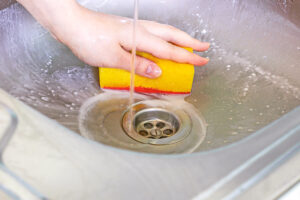
Chemical drain cleaners are a convenient solution to a frustrating problem, but they come with their own pitfalls to consider.
Chemical drain cleaners are a go-to solution for many homeowners when faced with a clogged drain. They’re often marketed as a quick and easy fix, promising to dissolve whatever is causing the blockage. However, while these products may seem like a convenient option, they come with a host of dangers that can affect your health, plumbing, and the environment. Understanding these risks can help you make informed decisions about how to handle clogs in your home.
Health Hazards
The active ingredients in chemical drain cleaners are often highly corrosive substances such as sulfuric acid or sodium hydroxide (lye). These chemicals are designed to break down organic material, which is the primary cause of most clogs. However, their corrosive nature makes them extremely dangerous to human health.
- Skin and Eye Irritation: Accidental contact with these chemicals can cause severe burns to the skin and eyes. Even a small splash can lead to painful injuries that require medical attention. If the cleaner is inhaled, it can irritate the respiratory system, leading to coughing, shortness of breath, and other respiratory issues.
- Toxic Fumes: The fumes released by chemical drain cleaners can be toxic. When these chemicals are used in enclosed spaces, like bathrooms or under sinks, the lack of ventilation can lead to the buildup of harmful gases. Inhaling these fumes can cause headaches, dizziness, nausea, and in severe cases, respiratory distress. Prolonged exposure may even result in long-term health effects.
- Poisoning Risk: If ingested, even in small amounts, these chemicals can be deadly. This poses a significant risk in households with children or pets. It’s important to store these products out of reach and be aware of the potential for accidental ingestion.
Damage to Plumbing
Chemical drain cleaners don’t discriminate between the blockage and your pipes. The same corrosive action that breaks down hair, grease, and other debris can also eat away at your plumbing.
- Pipe Corrosion: Frequent use of chemical drain cleaners can weaken your pipes over time, especially if they are older or made of materials like PVC or metal. The chemicals can cause corrosion, leading to leaks, pipe bursts, or even complete pipe failure. This can result in costly repairs and water damage to your home.
- Harm to Septic Systems: If your home uses a septic system, chemical drain cleaners can disrupt the delicate balance of bacteria that is essential for breaking down waste. These chemicals can kill the beneficial bacteria in your septic tank, leading to clogs, backups, and potentially expensive repairs or replacement of the septic system.
Environmental Impact
The dangers of chemical drain cleaners extend beyond your home and into the environment. When these chemicals are washed down the drain, they eventually make their way into the water supply and ecosystem.
- Water Contamination: Many of the toxic chemicals in drain cleaners are not easily broken down and can contaminate groundwater, rivers, and lakes. This contamination can have harmful effects on aquatic life, as well as on the quality of drinking water.
- Disposal Challenges: Disposing of unused or leftover drain cleaner is another environmental concern. These products cannot simply be thrown in the trash or poured down the drain, as they can cause harm to waste management workers and contaminate landfills. Proper disposal often requires taking the chemicals to a hazardous waste facility, which many people may not be aware of or may find inconvenient.
Alternatives to Chemical Drain Cleaners
Given the risks associated with chemical drain cleaners, it’s worth considering safer alternatives for dealing with clogged drains.
- Mechanical Methods: Tools like plungers, drain snakes, and jetting services can physically remove clogs without the need for harsh chemicals. These methods are often effective and safe for your pipes and health.
- Natural Solutions: For minor clogs, a mixture of baking soda and vinegar can be an effective and eco-friendly option. The reaction between these two ingredients creates a fizzing action that can help break down some types of blockages. While this method may not be as powerful as chemical cleaners, it’s much safer for your plumbing and the environment.
- Enzyme Cleaners: Enzyme-based drain cleaners use natural bacteria and enzymes to break down organic material in clogs. These products are generally safe for your pipes, septic system, and the environment. They may take longer to work than chemical cleaners, but they are a much safer option overall.
Preventive Measures
The best way to deal with clogs is to prevent them from occurring in the first place. Simple habits like not pouring grease down the drain, using drain screens to catch hair and debris, and regularly flushing drains with hot water can help keep your plumbing clear.
Call Mahon Plumbing Today
If you still have more questions regarding your plumbing, we here at Mahon Plumbing are here to help. We have been serving the wider Baltimore area since 1994, so we have 25 years of experience to back up our fantastic service! Call us at our Baltimore location at 410-766-8566 or our Pasadena location at 410-636-7944. Be sure to keep up with us on social media by following us on Facebook or Twitter.
